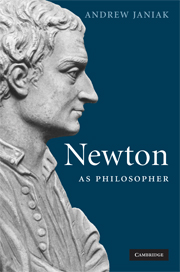Book contents
- Frontmatter
- Contents
- Preface
- Note on texts and translations
- 1 Newton as philosopher, the very idea
- 2 Physics and metaphysics: three interpretations
- 3 Do forces exist? contesting the mechanical philosophy, I
- 4 Matter and mechanism: contesting the mechanical philosophy, II
- 5 Space in physics and metaphysics: contra Descartes
- 6 God and natural philosophy
- Bibliography
- Index
1 - Newton as philosopher, the very idea
Published online by Cambridge University Press: 22 September 2009
- Frontmatter
- Contents
- Preface
- Note on texts and translations
- 1 Newton as philosopher, the very idea
- 2 Physics and metaphysics: three interpretations
- 3 Do forces exist? contesting the mechanical philosophy, I
- 4 Matter and mechanism: contesting the mechanical philosophy, II
- 5 Space in physics and metaphysics: contra Descartes
- 6 God and natural philosophy
- Bibliography
- Index
Summary
What does it mean to treat Newton as a philosopher? We cannot identify any overarching philosophical position with Newton, as we identify dualism with Descartes, monism with Spinoza, or even classical empiricism with Locke. Newton never wrote a systematic philosophical treatise of the order of the Meditations, the Ethics, or the Essay. This was a significant choice, for he was perfectly familiar with such treatises, having already analyzed some in his youth. Even in his voluminous correspondence, and in his most important unpublished manuscripts, we do not find a systematic engagement with metaphysical issues akin to Descartes's. Newton positioned himself as a strong critic of Cartesianism, but his response to Descartes is significant as much for its lacunae as for its central claims. Thus these canonical philosophical figures, with their canonical texts, cannot serve as a model here.
To treat Newton as a philosopher might simply be to avoid an anachronistic characterization of his intellectual milieu. As scholars of the early modern period regularly note, the intellectual categories and disciplines of Newton's day – which ranges, roughly, from 1660 until 1730 – differ radically from our own. What we would consider to be separate fields of study – for instance, aspects of what we categorize as philosophy, especially metaphysics and epistemology, the physical sciences, and even theology – were interwoven into one overarching field called natural philosophy.
- Type
- Chapter
- Information
- Newton as Philosopher , pp. 1 - 10Publisher: Cambridge University PressPrint publication year: 2008



